

Prasidh Arora perseveres to become "the engineer I've always wanted to be"
By Margo Kissell, university news and communications
Senior Prasidh Arora took a leap of faith when he chose Miami University nearly 9,000 miles away from home. The only thing he knew about it was from a website and some Google images.
As a high school senior in Mozambique and the son of an Indian diplomat who moved every three years, Arora said something persuaded him to be illogical and pursue a degree in computer engineering at Miami.
He has no regrets. For the past four years, he has made unforgettable memories — forging lifelong friendships, dancing at his first Diwali function and earning a spot in the College of Engineering and Computing’s (CEC) Lockheed Martin Leadership Institute. Miami is where he snagged his first job as a resident assistant and learned to code.
And on Saturday, with one more semester to go, he was a featured speaker at the CEC's graduation ceremony.
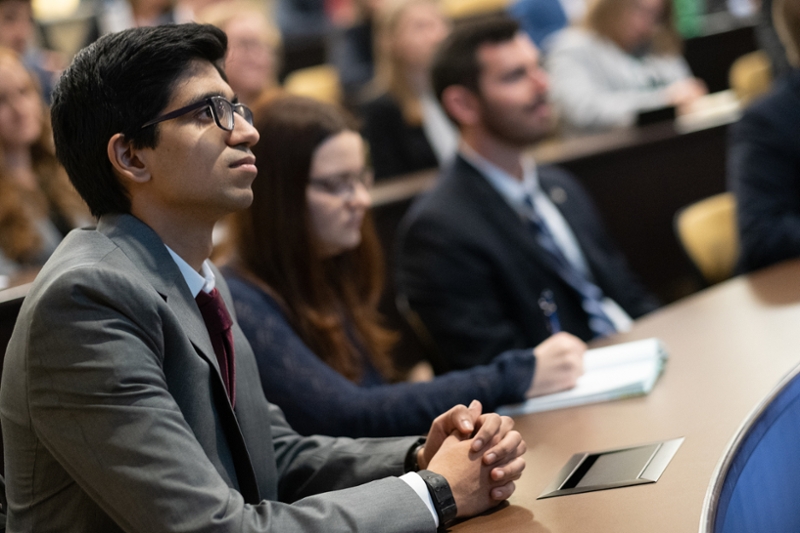
Prasidh Arora listens during a Lockheed Martin Leadership Institute event (photo by Scott Kissell).
In the spring of his sophomore year, Arora became paralyzed from the chest down after suddenly developing Transverse myelitis (TM), a rare neurological disorder. He spent two weeks in intensive care battling for his life and eight months in hospitals and rehabilitation centers fighting to regain his ability to walk.
He returned to Miami in January 2018 in a wheelchair. Although it wasn’t easy, he craved being more than a patient and didn’t want to lose sight of his educational and career goals.
Late last year, the computer engineering major with minors in computer science and mathematics landed his dream job with technology giant Microsoft. He will start in a full-time program management role at its Redmond, Washington, based headquarters when he graduates in December.
“I am proud to be joining a company that sees past my disability,” Arora said. “Despite the emotional and physical struggle that I have been through, I am happy that there are still people who see me for the engineer I’ve always wanted to be.”
"It was terrifying ..."
As the recognition speaker at the CEC’s May 18 graduation ceremony, the resilient 21-year-old shared lessons he has learned, including how fragile and unpredictable life can be.
“Everything can be normal one moment and completely changed the next.”
For Arora, that frightening day came April 23, 2017.
Two friends rushed him to the University of Cincinnati Medical Center after he became seriously ill. He experienced ascending paralysis, which began in his feet. It grew worse overnight.
“I woke up at UC and the paralysis had reached my fingers,” said Arora, whose parents flew in from their home in London, England.
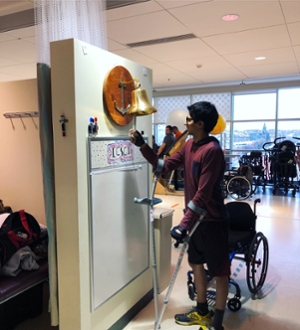
Ringing the bell at Kennedy Krieger (photo courtesy of Prasidh Arora)
“It was terrifying and, in many respects, it was a miracle he lived,” said Louise Morman (Miami ’75), executive director of the leadership institute and a CEC instructor who spent hours with him at the hospital.
Arora had gone to the doctor days earlier when he began feeling ill. At that time, mononucleosis was suspected in the otherwise healthy young man who’d hiked 50 miles of the Appalachian Trail over spring break three weeks earlier.
Doctors now believe he was bitten by a tick carrying Lyme disease. That triggered Transverse myelitis, which often damages the insulating material covering nerve cell fibers.
There isn’t a prognosis for the condition, which Arora said can take weeks, months or years to recover from, if at all. The feeling in his hands and fingers returned while he was still at UC Medical Center, but not below his chest.
After he was released from the hospital, he joined his parents in London, where he worked on his rehabilitation.
He later spent several weeks in physical therapy at Kennedy Krieger Institute, an affiliate of Johns Hopkins, in Baltimore. His parents relocated there to be near him.
Arora sweated up to seven hours a day, six days a week, all for “a glimmer of hope” that he might walk again.
A flicker came in early 2018 when he walked a short distance with the aid of forearm crutches.
Achieving the goal allowed him to ring a bell mounted on the wall in the spinal cord gym at Kennedy Krieger, where he will return again this summer. Every time it rings, it means someone reached a milestone.
“That bell rings every single day,” he said.
So far, he’s only rung it once.
“With TM, it’s very up and down, where one day you could feel like you have great progress and the next day it’s nothing.”
Resuming his studies at Miami
Arora considered transferring from Miami to another university in Maryland.
“Given the choice, why would I not transfer somewhere closer to Baltimore where I’m with my family?” he said. “But I had spent so much time here and am so close to being done, and I’d made enough connections that it was worth coming back here to finish.”
In particular, he loved Miami’s rigorous academics and participating in the leadership institute’s program, which is similar to what midlevel executives go through. He was part of this year's DataFest-winning team, the Standard Deviants.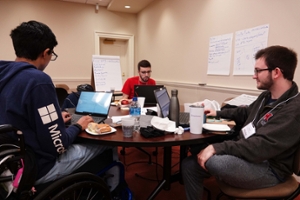
Arora with his DataFest-winning team, the Standard Deviants (photo by Jay Murdock).
He’s enjoyed serving in Engineers Without Borders (EWB). The club made him feel like he could make an impact such as when he was in Mozambique teaching children English and math.
“We used to spend so much time playing soccer, playing things that would connect everyone no matter what language you speak or what social class you’re from,” he recalled.
Arora served on the EWB leadership team for water system projects in Rwanda and Uganda and was instrumental in spearheading a moveable greenhouse at Miami’s Institute for Food farm on the edge of Oxford.
What he liked best was how the club allowed him to apply a problem-solving mindset to a project. Now his biggest challenge was adjusting to his new circumstances.
Pushing himself outside his comfort zone
Returning to campus after eight months away was difficult, he said, but the support from family, friends and faculty eased the transition. He moved from Emerson Hall where he had been a resident assistant into a fully accessible room in Ogden Hall.
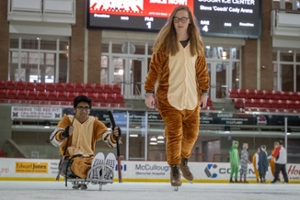
Arora and Anne Poindexter in skating class (photos by Scott Kissell).
Miami’s Miller Center for Student Disability Services and the Student Success Center found a scholarship to cover the cost of his transportation to therapy in Cincinnati three days a week.
“Professors understood and they didn’t mind and helped me catch up,” said Arora, who had established himself early on as a top student. Four times he earned a 4.0 GPA and a spot on the president’s list.
He remains driven in his classes — which doesn’t surprise friend Anne Poindexter, a biomedical engineering major with a premedical studies co-major who graduated last week. They knew each other through the leadership institute and EWB.
“He has a compulsion to figure out things that’s really amazing to watch,” she said, remembering when he and a classmate built a Turing machine, a mathematical model of computation. His perseverance, which often involved working on it until 2 a.m., paid off when it proved successful.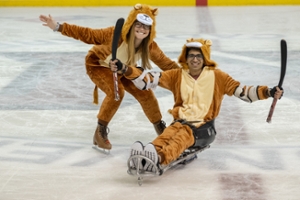
His perseverance paid off again last semester when he took a skating class at Goggin Ice Center, where he had enjoyed skating with friends before his illness.
Poindexter took the class with him — and made him stick with it when he was tempted, many times, to drop it.
“The main reason I took it was to get out of my comfort zone and try something that I knew would make me feel uncomfortable,” he said.
Poindexter recalled how happy Arora was when he figured out how to use an accessible ice sled, which offers a seated option for skaters.
“I think to him that was getting back a piece of his life he thought he had lost forever,” she said. “To me, that was opening a door for him to realize there are things he may have thought he lost because of his injury that he can have.”
Grief and resilience
Last Saturday, Arora returned to Goggin for his speech at the CEC graduation ceremony.
Walking to the podium using forearm crutches before sitting back in his wheelchair, he shared his story with the graduates and their families. He told them how he had grieved the loss of his ability to walk. But, in some ways, the experience has made him stronger.
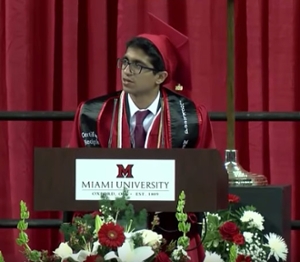
Arora spoke at the CEC graduation ceremony. Watch the video.
Watch another inspirational video featuring Arora and three other students. It played at the ceremony.
“People bounce back from hardship in different ways,” he said. “And it’s when you hit your personal rock bottom that you bounce back more resilient.”
He began his junior year a different person because of his illness. To adjust, he started with ordinary tasks. Talking on the phone and replying to emails. Reading a book. Picking up a circuit. And coding once again.
“What I didn’t realize is that I was starting my life again surrounded by people that were, and still are, far from ordinary.” It was those people — from his parents to everyone who called and texted him every day while he was in the hospital — that got him through.
“I am beyond grateful for this community,” he said. He urged graduates to be grateful for the community around them no matter where they go. And he encouraged them to take their own leaps of faith in life “because something incredible could be on the other side.”
Four years after his own leap brought him to Miami, Arora said every time people hear that he has lived around the world, they ask his favorite place.
Today, he said, without hesitation he would reply, “Oxford, Ohio.”
